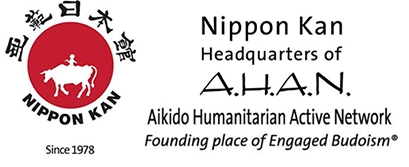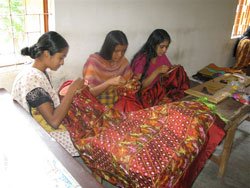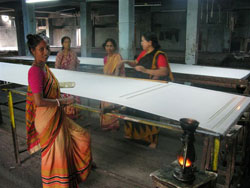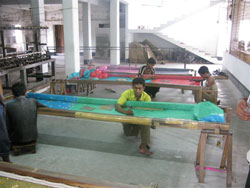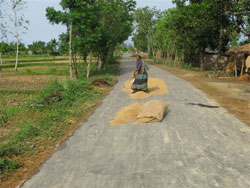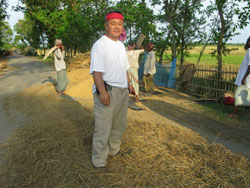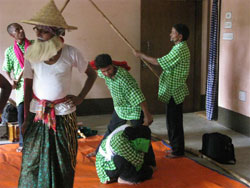By Gaku Homma
Nippon Kan Kancho
July 16th, 2008
As usual, AHAN Coordinator Maji Sarkar and Barbar Ratan were at the airport to meet me when I arrived in Dhaka. Barbar Ratan is actually a barber. He is very savvy about local affairs and has many connections. Both he and Maji are very nice to have as part of the AHAN Bangladesh team.
Maji’s parents own the Hotel Sealand right across the street from the central railroad station and international bus terminal. I checked into the hotel and had dinner at the hotel’s adjoining Bangladesh styled café. Dinner that evening consisted of a large helping of rice, about a quarter cup of mutton curry, five thin slices of cucumber, a few long thin hot green chili peppers and two skewers of thumb sized pieces of meat on a stick. The skewers were extra that evening, about $2. By Muslim rule, there was no alcohol served with the meal.
After lathering down with insect spray and lighting a mosquito coil, I settled down for a good night sleep. I was back in Bangladesh.

Many come from the countryside to Dhaka looking for a new way of life.
The first order of the following morning was to figure out what to wear. Fashion was not a consideration. As a seasoned traveler, all of the clothes I carry are utilitarian and this time I packed clothes to help deal with the very hot weather. I always find it best not to dress in clothes that attract extra attention as a foreign traveler; this is just a basic safety precaution. When I travel to teach Aikido I need to bring at least two keiko gi and a hakama which are heavy and take up a lot of room in my bag. Even if I wanted to buy clothes here in Bangladesh it is difficult to do so; there are not many clothes available in my size.
One step outside and my clothes are drenched in sweat. This can be a nuisance especially if I am to meet someone that day. I usually wear cotton short sleeved t-shirts to help soak up extra moisture and carry a couple of extra t-shirts in my day pack. This way I can change shirts if necessary. Khaki pants I have found are good to wear while traveling; they don’t show dirt and are comfortable in all types of climates. This is my travel uniform. Looking at photos after a trip, it is a little amusing to see that I am dressed in almost the same clothes in every picture. Sometimes in my travels I am required to be dressed a little more formally, which can defiantly be more of a challenge. It is important however. Even though “It’s what‘s on the inside that counts,” I have found that wherever you go—you are judged by how you appear on the outside, first.

Barbar Ratan’s family.
First on my agenda for this trip to Bangladesh was on-site research. I had been studying about the effects of global warming and greenhouse gases in an area of northwest Bangladesh. The area most affected, I learned, was near Rajshahi, the 3rd largest city in Bangladesh. Rajshahi is built on the banks of the Padma River and big climatic changes have been occurring there. Maji, Barbar and I headed for the Cantomento train station near the Dhaka airport. From there we boarded the Silk City express night train for the six-hour ride to Rajshahi. The train to Rajshahi is called the Silk City express because Rajshahi is famous for its production of silk. A first-class sleeping car with four beds cost about 700 Taka ($10 US) per person. The train was very clean and comfortable and the service was very good. The train also was running on time. Our train left Dhaka at 1:45 am and I noted that our car had armed guards stationed at both ends. The guards, I was told, would stay at their posts until the end of the line.
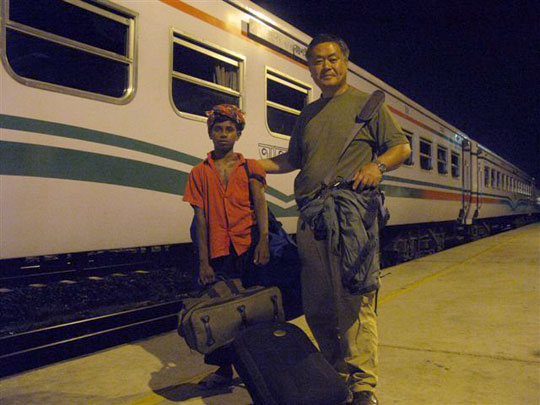
Summon has worked at the station for three years as a porter. He has been through the 4th grade, and dreams someday of owning a fruit stand. It is already past midnight, and Summon is still working.
-

-
The Silk Express night train.
-

-
Clean and comfortable cabins.
At 4:30 am., the sun had already begun to rise. By 5:00 am., people could be seen tending their crops in the fields that passed quickly by. There were lots of rice fields in this part of Bangladesh and the first crop of rice this year had just been harvested. In no time, the train was nearing our destination and we stepped from the train into a nice but very busy station for so early in the morning.
Outside the station the streets were lined with rickshaws waiting for their first fare of the day. It was not yet 6:00 am and already the city was alive! Rajshahi residents mixed in with the Bangladesh border patrol soldiers who seemed to be moving through the streets in patrols. In April the lychee fruit is in season and large baskets filled to the brim with hand-sized branches of them were for sale in front of the station.
-

-
Early in the morning, the station is bustling
-
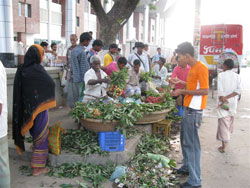
-
Lychee vendor in front of the station.
-

-

-

-
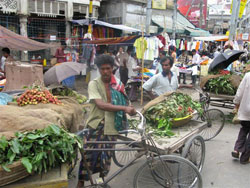
The streets were busy, but the storefronts were still shuttered shut. We hopped on to a couple of rickshaws and headed to a café area. The menu was the same as what I had in Dhaka for dinner: rice and mutton curry and chai tea to drink. Breakfast for the three of us cost $3 US. Barbar negotiated with the café owner who finally agreed to keep our bags in the back for the day which lightened our load considerably for the day’s outing. It was still only 7:15 in the morning and we had the whole day ahead of us.
We headed for the Padma River where we hired a river boat that looked like it had seen many, many years of service. The boat was powered by an engine that was started with a pull cord. The boatman’s name was Maji Rubel, who was born and raised on this river. He had spent 5 years in the military and now made a living for himself and his family on the river. “Maji”, I was to learn was the Bangladesh term for river “boatman” He had an interesting story to tell…
He began, “The rain does not fall as much as it used to here, and the weather has been hot and dry for a long time which is very unusual. I do not understand why, but without rain, the river has risen substantially. We are heading for a chu which is an island in the middle of the river. In another 15 days, this chu will be completely submerged. (Information dated May 27th, 2008). Five years ago, only in the rainy season, which lasts about three to four months a year, did the water rise high enough to cover this chu and even then it was never completely submerged. Now all of the river’s chu are submerged for more than six months a year.
The poorest people in the lowest caste level live on these chu and the rise in the water level is threatening their survival. With the chu submerged so many months of the year, the people that live there are no longer able to plant and harvest crops to survive.” This change in the river has forced the people of the chu to abandon their meager homes and become homeless wanderers on the mainland. They have no identification, social status, possessions or food. Obviously their presence on the mainland has become a problem for the villagers and fishermen there. The rising of the river has been “chasing out the poor” in an area where survival is a challenge in the best of conditions. “We want to help these people, but we must care and protect our families first,” said Maji Rubel.
-
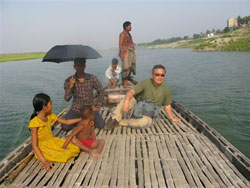
-
On our way to a large river chu.
-

-
Morning bathing ritual.
-

-
This chu soon will be underwater.
-
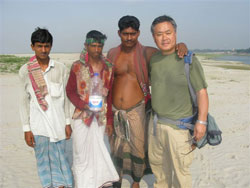
-
The men of the chu.
Our river boat made its way to a chu that is still owned by an English landlord. Two weeks ago the meager rice crops there were harvested. It takes 90 days to plant, grow and harvest the rice on the Padma river chu. Maji Rubel has a rice field on this chu and was able to harvest about 2,200 kilos of rice for himself and his family. He is required to pay 600 kilos of his rice harvest to the English landlord. The net income produced by this harvest is about $120 US. “In days past, we used to get two harvests before the river rose. Now there is only enough time for one. If the river continues to rise we will not be able to produce any rice at all.” If this happens, the only way that Maji Rubel will be able to support his family is by ferrying travelers across the river. With a family of five to feed, he worries about his family’s future. The people living on the chu that have fled their homes to live on the mainland have also flooded the labor market, reducing the going rate for labor wages. This has hurt the income levels of the local mainland villagers in the area.

The lack of rain damages the crops.
The locals in this area understand very well the effects this has had in their lives, but the do not understand the cause. They have never heard of global warming or of greenhouse effects nor would they totally understand such concepts. Scientists and even the United Nations have concluded that the Himalayan glaciers are melting at an increasingly faster rate every year. This is where the water is coming from that is seriously affecting the lives of people like Maji Rubel and his family.
Who is responsible for this? The people that barely scratch out an existence on the chu of the Padma river have certainly done nothing to affect their own environment; they have been living the same lifestyle for centuries. They are however being greatly affected by these global changes. Their only choice now is to become homeless wanderers during many months of the year which has in turn has put a new strain on the resources available in the area. This is causing human conflict where there was none before. The people of the chu have not benefited or profited from the causes of global warming, they have only felt the effects it has had on their means for survival.

Boatman Maji Rubel
Returning to Rajshahi, we hired a taxi to take us the 45-minute drive east to the border area between Bangladesh and India. The ride was exhilarating to say the least; I think we broke all overland speed records set in this area. We were on our way at a terrifying pace to the village of Chapai-Nawabganji.
I was informed before this trip that Captain Roney, a graduate uchideshi of Nippon Kan Headquarters, would be in this area of Bangladesh as the same time as my visit. He was going to be involved in special projects in the area that I was very interested in seeing.
-
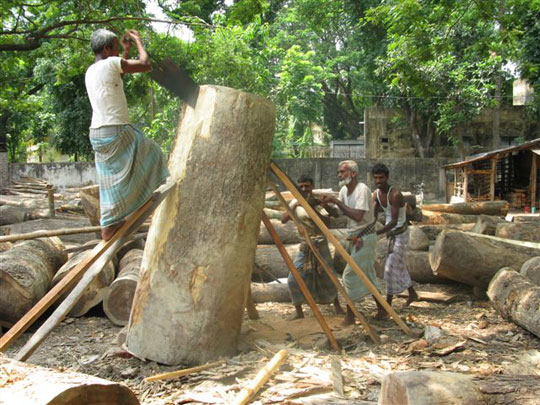
-
Planking trees; a centuries old tradition.
-
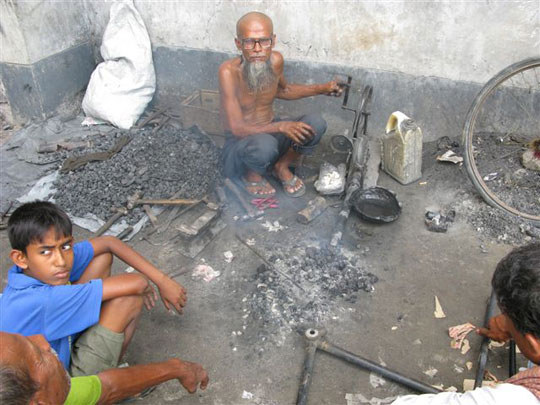
-
Elder welder and metalsmith.
-

-
Local JICA Karate Instructor teaching class.
The drive to Chapai was very scenic and offered a good picture of life in rural Bangladesh. Farmers we passed were busy after the recent harvest and bags of rice and bundles of rice straw were piled high along the sides of the road. The rice straw is used not only to feed the animals, but also serves as durable materials for roof and wall thatching. The scenes we passed reminded me of the countryside of Japan not so long ago. The road we traveled had been covered in places with a layer of freshly harvested rice plants to dry in the sun. The cars passing on the road served as makeshift thrashers, helping to separate the wheat from the chaff! Kids everywhere love swimming, and in most every river we passed, children were playing in the water; even water that was dark with silt and mud. The kids seemed to have made great friends with the water buffalo who also were enjoying the coolness of the rivers. The houses we passed were framed with bamboo and had walls made of hanging bundles of rice straw, adobe or of unfired mud bricks.

The river; a source for life.
-

-
A local corner local restaurant.
-
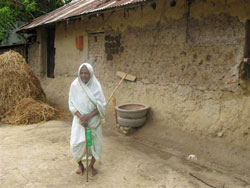
-
Elder in front of a farmers house.
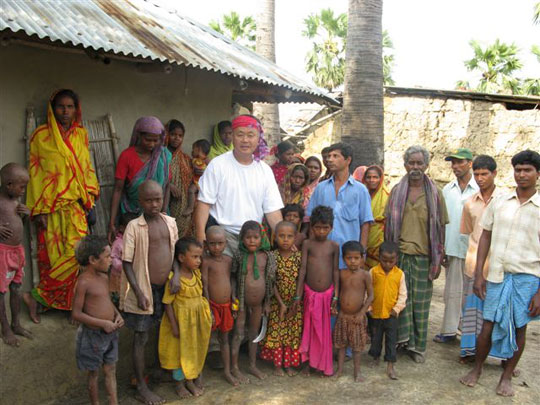
Homma Kancho with local villagers.
-
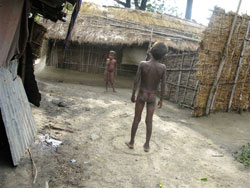
-
Children of the countryside.
-
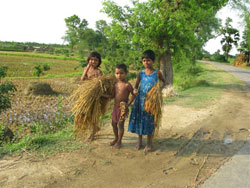
-
Bangladesh’s “The Gleaners” by artist Jean François Millet.
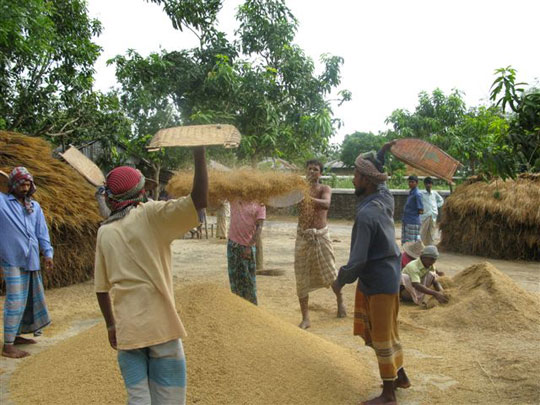
Separating the grain from the chaff.
The road is best place to work.
After arriving in Chapai and checking into a hotel, I spent about five hours exploring the town. People were very friendly, and I did not feel uncomfortable walking alone. Chapai was built on the banks of the Mahananda River and is famous for having the best mangos in Bangladesh. There were mango trees everywhere which obviously no longer impressed the native people, but were quite a wonder to me! Maji and Barbar were also delighted and made arrangements to take back as many mangos as we could carry to Dhaka. The mango trees were plentiful and some of them were so large two people would not be able to encircle their circumference with outstretched arms.
-
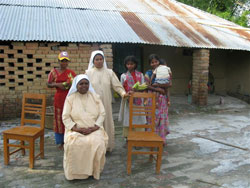
-
Sisters from the missionary.
-
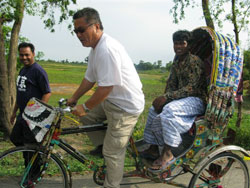
-
It looks easy, but its NOT!
Evidence of global warming had also affected this area. The Mahananda River had been rising unseasonably, causing the flooding of rice crops and other damage in mid-season. The lives of the farmers and villagers in this area too were being compromised. I was standing on the banks of the river taking in the view when a farmer approached me and asked me if I would like a cup of tea. He said this in perfect English which was a little surprising but I gladly accepted his invitation. His family’s home was close to the river bank. “I think some day I too will move back here, it is such a beautiful place,” he said. “The river however is rising, and when it rises, it comes within one meter of my front door.” As it turned out, this gentleman had made his career as a university professor in Dhaka, but his family lives here. He had just returned home for a brief visit. It was a pleasant surprise to meet him, and a delightful way to spend a little time by the river in this beautiful countryside of Bangladesh.
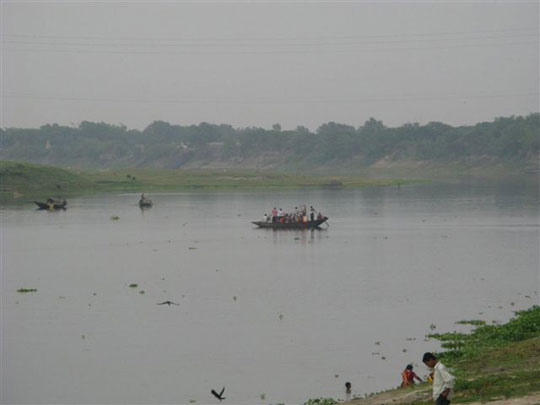
By first impressions, Chapai seemed like a happy, laid back country village. I was to learn however that this was not entirely the case. Chapai is located very near the border between India and Bangladesh and this area is well known for drug and weapons smuggling and even human trafficking. Chapai looked quaint enough, but there is a lawless and dangerous element here that has been having a very negative effect on the people who live here.
One other major factor that has been contributing to the lawlessness of Chapai is the fact that the local people do not trust the police or the military in control of this area. The reigning authorities have been known to be “on the take” in these illicit activities and the people do not trust them. To facilitate in the improvement of the social and security conditions in this area, the US Army in conjunction with the Bangladesh Army, local police and NGO are working together to solve the problems of the lawlessness, illegal activities and corruption in the area.
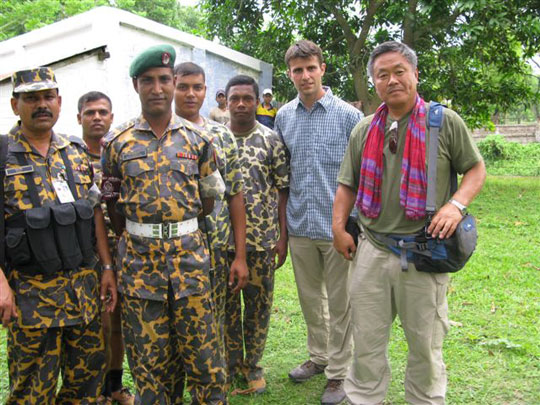
Bangladesh Soldier, Captain Roney and Homma Kancho.
-

-
Captain Scott enjoys a friendly conversation with the locals.
-

-
The school project.
-
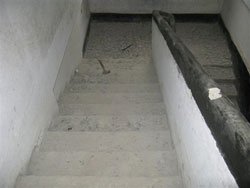
-
Refinishing the floors by hand.
-
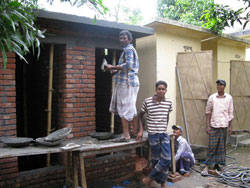
-
A make-over for the “facilities”.
In the United States, community service and social development projects are common, but in this area, the projects being developed by civilian and military leaders is groundbreaking. Captain Roney has been involved in this project as a US Army consultant. Unarmed and dressed in civilian clothes, Captain Roney has established his position as a person of trust with local leaders both civilian and military. His business cards carry his position and the flags of both the United States and Bangladesh. Since the danger is high in this area especially for American Military consultants, Captain Roney traveled everywhere in Chapai with two Bangladesh Army guards at his side.
I met Captain Roney and went to visit one of the community development projects he’s been involved with in Chapai. The US and Bangladesh military troops, local police and civilian NGO personnel had been busy for the last few weeks rebuilding a school. So far, all the floors had been reinstalled and the building repainted inside and out, so they were making progress. That day a high level delegation from the US Embassy to Bangladesh visited Chapai to check on the progress of this joint community development project. Next on the agenda for this newly formed team is the building of a new school from the ground up in another part of Chapai.
The second reason for my visit to Chapai was to check in on a special group of performers in the area. One of the consequences of the trafficking and corruption problems in the area, was the social education of the Chapai community and surrounding areas which has deteriorated and was in desperate need of rehabilitation.
A local NGO with a group of innovative and talented young people in Chapai developed a unique approach to help teach those in the community about social values and wellness. They created a traditional opera and theatre troupe that travels to many of the villages in the area performing a very entertaining show filled with positive social lessons. If this method proves to be successful in changing social values in the local villages, it could be a wonderful education tool in remedying social ills in many other parts of the world. East Timor would be another great place for example, for this type of approach.
-
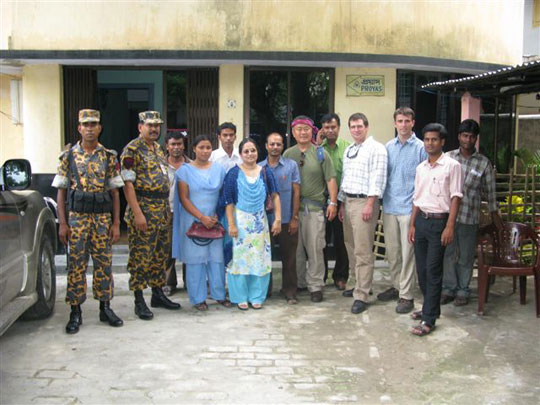
-
Traditional opera and theater troupe in front of the NGO office.
-
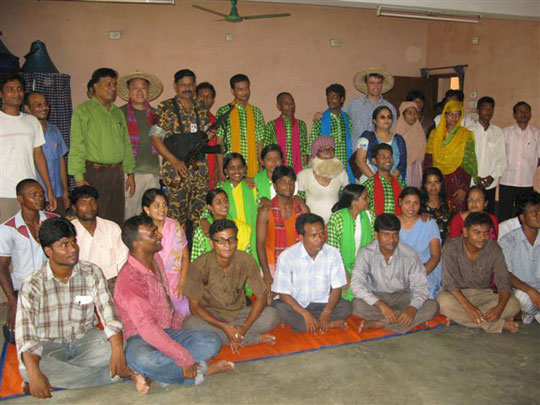
-
A troupe group photo!
We went to the troupes training facility to meet them. The group of about 15 men and women were all about 25 years of age. Their facility was extremely hot and humid that day which made both performers and observers drenched with sweat as they practiced their songs, dances and acrobatic tumbling routines. We watched their one and a half hour performance which included very entertaining songs and dances addressing social issues like the evils of domestic violence, drugs and rape, and also the social virtues of going to school, good hygiene and communication between generations.
The artists used traditional musical instruments, colorful scarves and a handful of pieces of bamboo to create sets for their performance. It was a very creative endeavor and a WONDERFUL performance. The troupe has a monthly budget of only $1,000 which has to provide for the salaries, living, travel and performance expenses for the entire troupe of 15.
The troupe travels from village to village, many that don’t have electricity, teaching the young and the old. These villages do not have much in the way of entertainment, so this traveling show is a very valuable, effective and powerful tool in reaching its audience and teaching its lessons. After the show, Captain Roney sang a local Bangladesh song and I, using a handy bamboo stick did a dance with a jo. Everyone seemed to enjoy our performances and clapped their hands in glee. It was a wonderful way to communicate and was a good day all around.
Scenes from the performance.
-
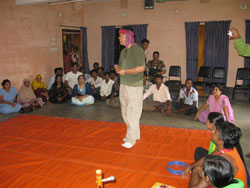
-
Homma Kancho gives a speech.
-

-
Captain Roney sings a song.
The US Government works in cooperation with many underdeveloped nations with humanitarian and community service projects like the ones that are on-going in Chapai. Especially in very isolated or politically unsettled areas, the people that go into these areas must be skilled not only in humanitarian work and communication skills but must also in emergency procedures. The US military has personnel that are specially trained and equipped with all of the necessary skills for these kinds of projects. It is a mistake to think that the US Military is only involved in combat missions around the world. The US Government is also involved in humanitarian support projects that include painting schools to providing medical supplies and doctors to some of the most remote areas of the world.
I asked Captain Roney why these important humanitarian missions of the US Government are not more widely publicized. He answered, “If we build a school or a religious facility or fix a road in a village and advertise that the assistance was supplied by the USA, it attracts attention. A rival interest might then become more aware of the area and seeking political dominance in the area might offer the same village leaders the opportunity to build a bigger school or fix more roads, just to gain politic favor. The negative effect of this kind of attention is that the village we were originally trying to help can become less self reliant, leaning more on currying political favor from other groups and even other countries than taking care of themselves. In this way the original intention for building the school in the first place is lost. This is one of the main reasons that most American people and other allied nations are not aware of the humanitarian projects the US Government is involved in.”
Reflecting on Captain Roney’s words, I thought of many of the places I’ve been that are affected negatively in this way. His ideas made perfect sense. Nicaragua for example is a country that AHAN stopped supporting a few years ago because many of the people there that we were involved with have lost their ability to develop projects on their own. The attitude in general there is more focused on manipulating others for aid than doing things for themselves. This detrimental attitude I believe started with the US involvement in the Contra wars so many years ago.
In East Timor, the Chinese lavishes gifts on this new democracy by building buildings and palaces for East Timor officials; all to gain political favor. If you look out over the capital city of Dily, there are many red roofs visible among the local housing. All of these red-roofed houses are gifts from the Chinese. China and Taiwan both give gifts and offer favors to gain access to East Timor’s government officials and fight over the airwaves to see which country will broadcast into the homes and minds of the East Timor people. Government corruption is prevalent in East Timor, and it is not only the Chinese or Taiwanese that attempt to curry favor with this small but strategic democracy.
This may be an old joke, but there are so many red roofs in Dili that if you added a bit of white paint you would have a great advertisement for Coca Cola!
After the great tsunami hit, many humanitarian agencies and volunteers rushed to give aid from all over the world. This was a wonderful outpouring of generosity and humanity, but some of the reactions from those impacted by the tsunami were not what had been envisioned. A staff member of an Italian humanitarian agency that sought to provide aid to the impacted areas in India told me the following story. “We went to a village to help build one-room houses to replace the houses that were destroyed. Village leaders told us that they did not want our help. ‘The next village near to us is being helped by the Germans and they are building two-room houses. We want them to build our houses not you.’ We were obviously very surprised,” the Italian volunteer said.
I met relief volunteers in Singapore who had a similar story. They explained: “In one area we, a fisherman had lost everything and was surviving by catching what fish he could from a small raft. He was using leaves from a coconut tree to make a make-shift shelter and the days he did not catch a fish, he went hungry. When relief workers arrived, they brought food, materials for housing, clothes and other supplies and gave them to the fisherman. Everything the fisherman needed was provided by organizations from many different countries. After all of the supplies were delivered, the fisherman replied, ‘Why do I need to be a fisherman or for that matter, do anything anymore, you have given me everything I need?’…” The volunteers in Singapore had found the experience disillusioning.
Especially after a disaster or crisis, many people have ideas and make plans to help those victimized. This shows a good spirit and sense of humanity, but sometimes there are people that act with ulterior motives and with their own benefit in mind. So for many reasons, sometimes help that is given can actually be more detrimental than beneficial to the people that are in need of assistance.
I visited these parts of Bangladesh for only a few days, but I saw many people who were losing their livelihoods or whose lives were changing due to influences of which they had no control. Their lives were slowly being invaded by the outside world; influences that were causing a decline in their ability to survive. In this slow decline is lurking a quiet desperation that can lead to lowered social values, manners and higher thinking. This leaves the doors open for violence, crime and even terrorist activity to take over.
Wealthy countries are too wealthy, and for poor countries there is no bottom to the depth of depravity. We ALL need to focus on this imbalance but in ways that create positive results.
I saw hope, joy and life in the future of Chapai, in “the young people who were taking a stand for their future” by creating their own solution with their own resources to the problems challenging them. The traditional opera and theater troupe are to be commended for their creativity, spirit and vision. I want to shine a light on the positive efforts of the young people like this troupe in Chapai and give support to them so that they may further build their own future.
That evening I waked again around Chapai for another three hours. It was a wonderful adventure to walk where cars could not go. I discovered the remains of old temples and stuppas which bore witness that once, long ago, Bangladesh was a Buddhist country. I stopped at one temple to look more closely. As I stood, a band of neighborhood children ran toward me with an old set of rusted keys. They were the keys to the temple and they motioned to me to follow them inside. There was a lot of damage inside but you could still see that once it was an elaborately beautiful temple. This place was a historical monument and should be preserved as part of Bangladesh’s cultural history, not just allowed to crumble back into the earth. The children here were very innocent. If this had been a temple in some of the places I have visited they would soon be asking me for money. These children just smiled, shook my hand and waved good bye. It was a precious moment.
-

-
The children open the doors to the temple with keys from the past.
-
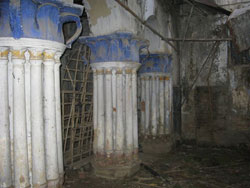
-
Inside the temple; seriously deteriorated.
We left the hotel at 5:00 the next morning to head back to Dhaka. A bright orange sun rose to greet us as we left, and the farmers began to move about their long day ahead in the fields. Goats, sheep, chicken, ducks, water buffalo, cows, dogs, and hundreds of birds joined the humans in celebrating the sunrise. The best place to work and to play it seemed for both humans and animals alike, was the road that laid before us, back to civilization and to Dhaka.
Cars are only an occasional visitor in that part of the world, but as they roared by at 70 kilometers an hour, animals and people alike were scattered with the loud honking of their horns. I asked as we sped down the road back toward civilization, “What if you hit something?” The driver answered, “I just keep going. If I were to hit a duck and stop, the villagers would surround my car and not let me pass until I had paid 100 US for the run-over duck. At a store, a duck costs 5 dollars. It is not worth it to stop.”
I reflected on the intrusion our vehicle, like the intrusion of the “civilized world” might cause in this peaceful place and replied, “Don’t remind me, I don’t want to spoil the beauty of this sunrise.”

